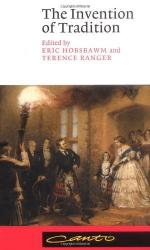
|
| Name: _________________________ | Period: ___________________ |
This quiz consists of 5 multiple choice and 5 short answer questions through Chapter 5, Representing Authority in Victorian India.
Multiple Choice Questions
1. The Highland Society had many aims including the repeal of laws forbidding _______ in Scotland.
(a) Prima Nocta.
(b) Highland dress.
(c) Weddings.
(d) Bagpipes.
2. For the assemblage, a/an _______ was built and the seating of Indian rulers was arranged.
(a) Council building.
(b) Amphitheater.
(c) Royal building.
(d) Theater.
3. The author claims that historians should attend to the phenomena of invented traditions because they provide evidence for historical ______.
(a) Trends.
(b) Societies.
(c) Religions.
(d) Wars.
4. The author states that there were some _______ Indians and Europeans located in camps around the ceremony area.
(a) 240,000.
(b) 84,000.
(c) 150,000.
(d) 24,000.
5. According to the book, royal ceremonials may have been an expression of national _______.
(a) Ignorance.
(b) Arrogance.
(c) Self-confidence.
(d) Doubt.
Short Answer Questions
1. Cannadine suggests that the British monarchy went through ______ distinct phases as the ceremonial image of the monarchy developed.
2. As a reward for their loyalty to the British, several Indians were given all of the following titles except ______.
3. According to the book, Welsh scholars and patriots rediscovered past traditions in all of the following areas except ______.
4. Love of ______ and economy brought hatred of displays of wealth by the crown, who also endured indifference from the clergy.
5. In Chapter 2, Hobsbawm asserts that Scotsmen celebrate their identity with common symbols including the kilt and ______.
|
This section contains 210 words (approx. 1 page at 300 words per page) |

|




